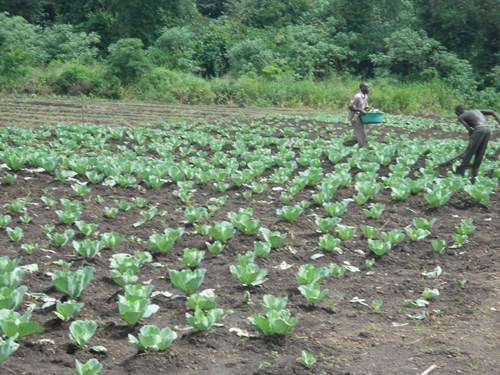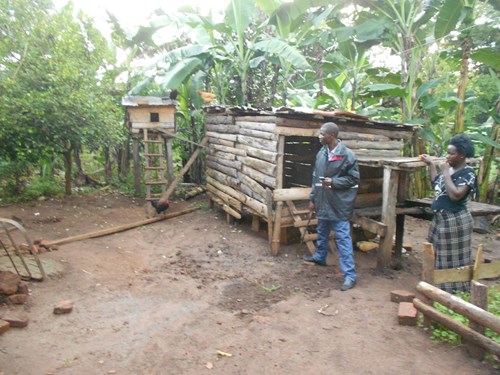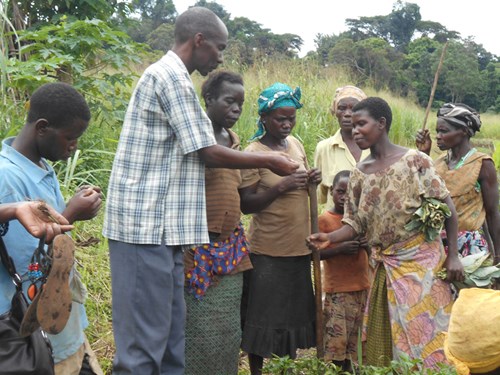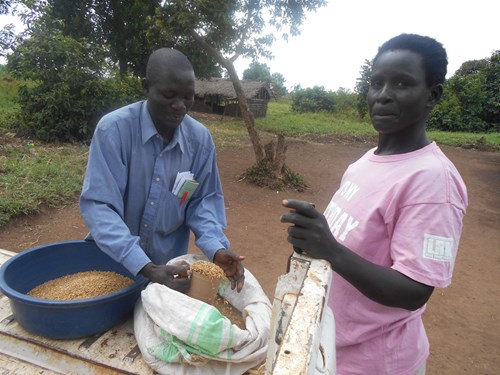News
Providing alternative livelihoods to forest dependent communities
April 15, 2016

Providing alternative livelihoods for communities bordering Budongo Forest Reserve has become a major concern, as pressure on the natural forest resources intensifies with increasing population. In turn, occurrences of illegal activities in the forest such as pit sawing and hunting also increases, which threatens the long term survival of forest flora and fauna, including the iconic chimpanzees.

In order to ensure harmonic coexistence between wildlife and these communities, an alternative livelihood programme was developed by Budongo Conservation Field Station (BCFS). The initial pilot project was set up with support from Oakland Zoo, Royal Zoological Society of Scotland (RZSS) and Flora and Fauna International and has since expanded to work in a number of villages around Budongo with additional support from ARCUS Foundation (implemented by Village Enterprise) and Darwin Initiative. When it was first launched, the programme focused on hunters, with the aim of improving household income and food security. Several hunters were identified in the communities and through a series of conservation education workshops, they were gradually brought to appreciate the need to protect wildlife.

This is an ongoing process; for many, practices like hunting are part and parcel of their cultural identity, but at the same time poverty has a firm grip among these communities. The people of Budongo need to survive and providing an alternative source of animal protein as well as income is crucial. With funds from our generous donors, we started off by providing two breeding goats to ex-hunter families that denounced illegal hunting and signed agreements pledging to support conservation initiatives. In addition to livestock rearing, through this project and in partnership with other local organisations, we are offering training in improved agricultural practices, providing farm inputs such as high quality seed and also providing opportunities for vocational skills development.

Over the years, the alternative livelihood programme has grown to benefit other forest dependants such as the illegal pit sawyers, the less advantaged and women in the area. The project beneficiaries are required to fulfill particular conditions prior to receiving any support. For example, they are required to denounce the illegal use of forest resources, be ambassadors for conservation in their communities and exercise good sanitation practices (which includes construction and use of functional pit latrines and establishment of animal housing in their homesteads), among others.

I wouldn't say it has been an easy ride, but progress is being made and the scheme has proved worthwhile. The number of snares recovered from the forest has reduced drastically to five snares per day from over 40 per day prior to the scheme. In addition to reducing the threat to wild fauna, a recent economic survey of 125 households benefiting from this programme revealed a 69% increase in household income (from 0.80$ per day to 1.35$ per day). This is mainly as a result of growing non-traditional food crops such as cabbage, carrots and okra which are high value and are also less prone to raids by wild animals.
Going forward, we hope to expand the project even further to benefit more hunters and forest dependant households around Budongo Forest. We hope that the elements that have catalyzed the success of this scheme will be useful lessons to other protected areas facing similar conservation challenges.
Until next time!
Jacintha N. Lwebuga,
BCFS Communication Coordinator
The alternative livelihoods programme has been made possible thanks to support from the Darwin Initiative.

Latest Articles
-
Launch of the “Budongo: Livestock for Conservation” Pilot Project
October 21, 2025
-
Revitalizing ornithology research at BCFS
November 30, 2024
-
Perspectives Collective Journal Launch
February 21, 2024
-
Snares are major threat to juvenile chimps in Budongo
November 25, 2022
-
Albino infant chimpanzee sighted in Sonso
September 07, 2021





